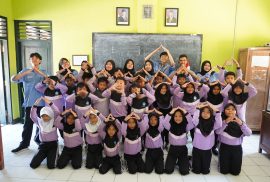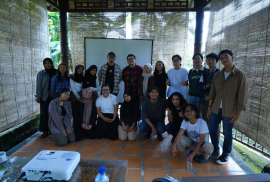“As a child, I always wondered: why is it that when I can think of something, others may not? And vice versa, others can come up with ideas that have never crossed my mind. Over time, I realized that every person possesses a unique way of thinking and their own kind of intelligence.”
This simple yet profound reflection has become the foundation for the inspiring journey of Noveza Prima Prasta, a second-semester student of Arabic Literature at the Faculty of Cultural Sciences, Universitas Gadjah Mada (UGM). Her path has led her into the heart of education—not merely as someone who teaches, but as someone who learns from life and the children she meets along the way.
Seeing the World Through a Child’s Eyes
At a young age, Noveza has actively immersed herself in various educational volunteer programs. Her firm belief that understanding a child’s reality and mindset is the first step toward change has shaped her journey. She has been involved in communities such as Rumah Mengajar UGM, Elbom, Arabic Camp, and TPA Al Akhdor. These experiences have taught her more than just how to instruct; they’ve revealed the beauty of character diversity, hope, and the limitless ways children perceive the world.
“Every time I engage with children from different environments, I learn one thing: no intelligence is greater than another. There are simply different brain functions and different life experiences,” she shared.
Education Beyond the Classroom
Noveza’s commitment to education goes far beyond academic content. She actively participates in inclusive educational initiatives like Sekolah Rakyat Serdadu Kumbang, where she emphasizes empathy and inclusivity in every learning session. She recognizes that education is not just about delivering materials—it’s about taking a stand, being present, and showing genuine care.
“Many children just need to be heard, appreciated, and assured that they are capable,” she said.
Her approach is not limited to being a teacher; she chooses to be a learning companion—one who listens to each whisper from a child’s heart, one who validates their silent hopes.
The Right to Learn, the Right to Be Understood
Throughout her journey, Noveza has often encountered a touching reality: many Indonesian children still lack access to learning spaces that honor their individual thinking styles and intelligence. She sees firsthand that every child has unique strengths. Some shine in logic, others in art; some blossom in discussion, while others thrive on emotional connection.
Unfortunately, a rigid, results-oriented education system often fails to embrace this diversity. Many students are left behind—not because they are incapable, but because their learning needs are unmet.
“Sometimes, I meet children who are labeled ‘slow’ at school. But when I engage them through play-based learning, they absorb information rapidly,” she explained. “The problem isn’t with the children—it lies in the approach that doesn’t yet accommodate all kinds of learners.”
A Life Devoted to Empowerment
For Noveza, volunteering is not a hobby—it’s a calling. She dreams of one day building a community learning center for marginalized children—a safe, joyful space where learning feels natural, stress-free, and full of warmth. In her view, consistent small actions, no matter how modest, can become beacons of hope in a world full of challenges.
One quote she holds dear encapsulates her mission: “العلم نور”—knowledge is light.
Her story reminds us that education should never be confined to walls, tests, or rigid systems. Instead, it must grow into a dynamic force that meets children where they are. For Noveza, every child—regardless of background—deserves an equitable, understanding space to grow. And in that space, the spark of learning becomes a light that never fades.
[Public Relations FIB UGM, Candra Solihin]




